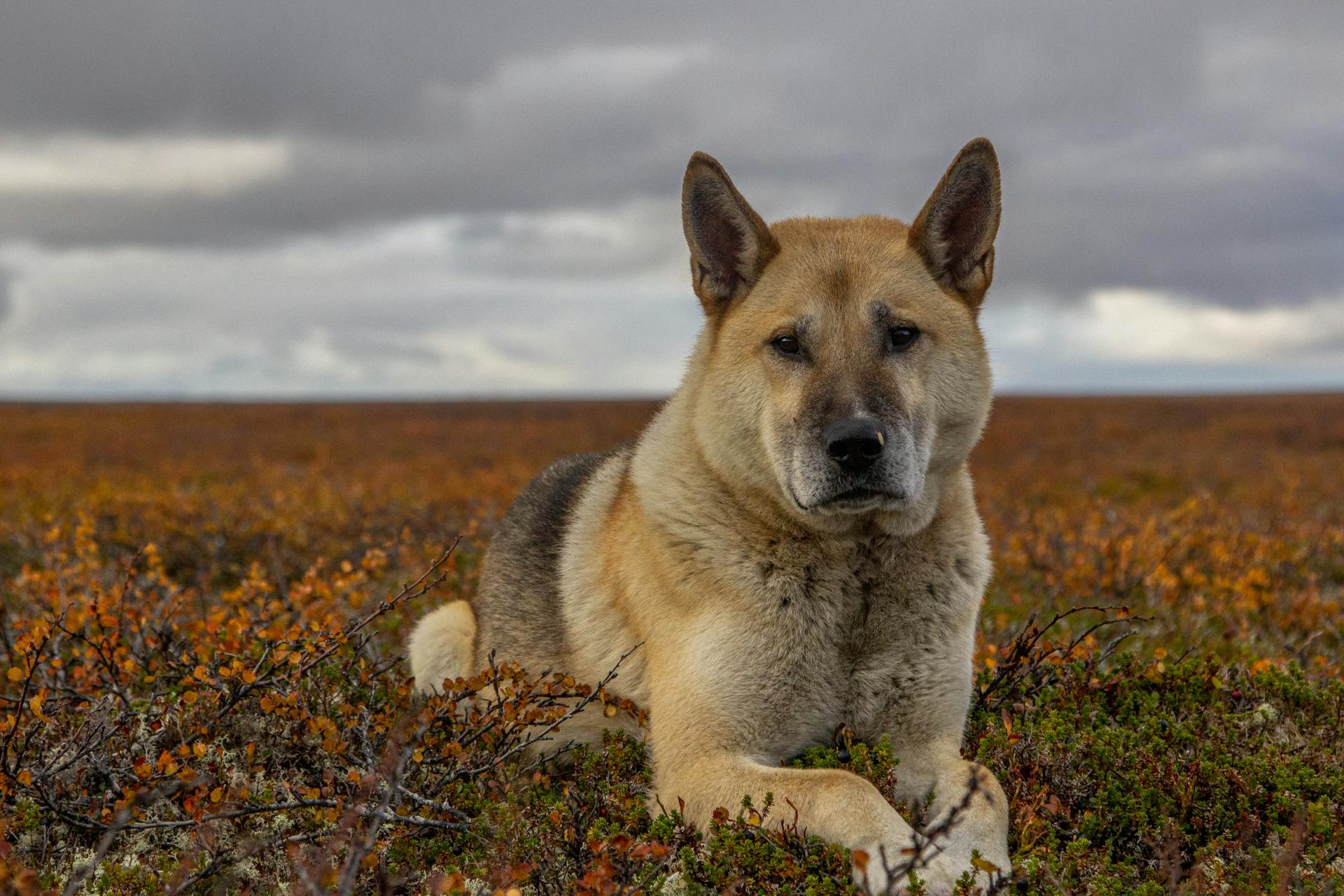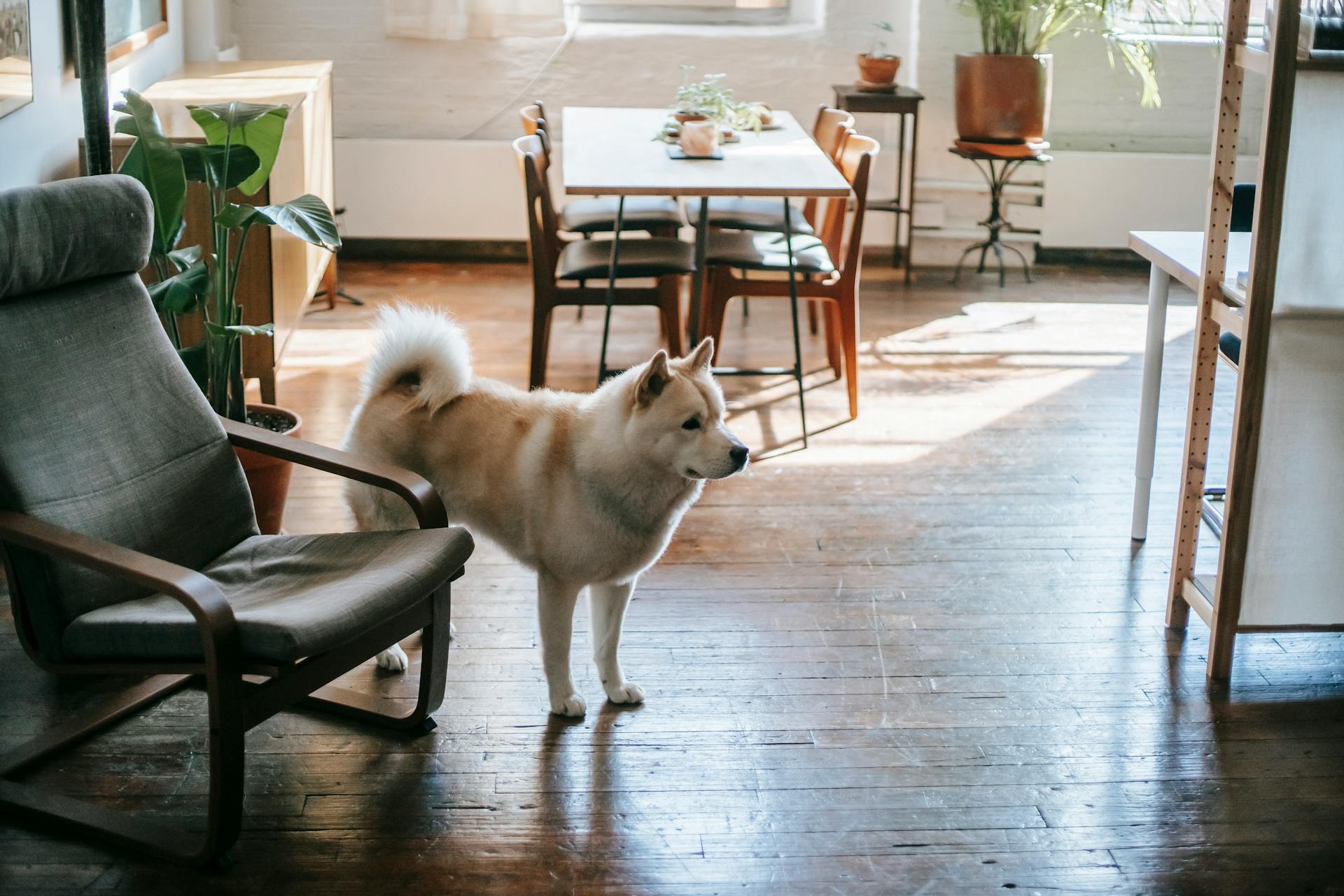
Living with an American Akita can be a wonderful experience, but it's essential to understand their temperament to ensure a harmonious household.
American Akitas are naturally protective of their family and territory, so socialization from an early age is crucial.
They are also known for their loyalty and affection towards their loved ones, making them great companions.
However, their strong instincts can sometimes make them wary of strangers, so it's essential to introduce them to new people gradually.
Akita Characteristics
The American Akita temperament is a unique blend of loyalty, affection, and protectiveness. Akitas are known to be relatively silent dogs, only barking when necessary, such as to alert their owners to potential threats.
Despite their large size, Akitas can thrive in small homes, as long as they receive regular exercise. In fact, they were originally bred to withstand harsh outdoor conditions in northern Japan.
One of the most notable characteristics of Akitas is their loyalty and affection towards their family members. They make great companions, but they can be wary of strangers and may even become protective.
Akitas have a tendency to "mouth" things, carrying objects in their mouths, which can be a challenge for owners. They also have a strong prey drive, which means they may chase smaller animals.
If you're considering bringing an Akita into your home, it's essential to know that they require regular exercise and mental stimulation. Akitas are not suitable for households with young children or other dogs, especially those of the same sex.
Here are some key characteristics of the American Akita temperament:
Overall, the American Akita temperament is a unique blend of loyalty, protectiveness, and affection. With proper care and attention, they can make wonderful companions for the right owner.
Life with Akita
Akitas love spending time outside, and a fenced yard where they can roam and sniff is ideal. They're not high-energy dogs who need to be constantly entertained, but they do need regular exercise to stay happy and healthy.
They're surprisingly adaptable to small homes, as long as they get enough daily exercise. This is great news for city dwellers who want a large breed dog.
For your interest: Dog Breeds That Don't Need Grooming
Akitas are relatively quiet dogs, and barking usually isn't an issue unless they're alerting their family to a visitor or something unfamiliar. They're also good watchdogs who will bark to alert you if something is amiss.
They're easily housebroken and like to keep clean, which makes them a great choice for people who value a tidy home. They'll even nap for hours throughout the day when they're not busy being their awesome selves.
Here are some key characteristics to keep in mind when living with an Akita:
Overall, Akitas are loyal and steadfast companions who thrive on attention and affection from their family.
Akita History and Facts
The Akita's rich history dates back to the 17th century in the Akita prefecture in Japan.
The Akita breed has a long and storied past, with evidence of its existence dating back to the Jōmon Period, a time spanning from 14,000–300 B.C.
Akitas were originally bred as strong, hard-working hunting dogs, but over time they transitioned into loving family companions due to their dignified demeanor and affectionate nature.
You might like: When Is the Best Time to Breed Your Dog
In Japan, the Akita is considered one of seven dog breeds designated as a natural national monument, and it's also seen as a symbol of good health.
The Akita first made its way to the U.S. in 1937, when Helen Keller brought a pup named Kami home after a tour through Japan.
The breed remained a rarity in the U.S. until after World War II, when returning American soldiers brought Akitas from overseas, introducing them to a wider audience.
The Akita was officially recognized by the American Kennel Club in 1972, solidifying its place in the hearts and homes of many Americans.
Consider reading: When Should You Breed a Female Dog
Akita Personality and Training
Akitas are known for their reserved temperament, but they're also incredibly loyal and affectionate with their owners. They make great watchdogs due to their natural distrust and hostility towards strangers.
These dogs are not typically suited for families with small children or other dogs, especially those of the same sex, as they may be aggressive towards them. However, with proper socialization, they can learn to tolerate other animals.
Related reading: Dogs Breeds That Start with B
Akitas are intelligent dogs, but they can be quite independent and headstrong, making them challenging to train. Consistent training from an early age is essential, and they thrive when given jobs to do and challenged with new tasks.
To train an Akita effectively, use positive reinforcement techniques, keep training sessions short and fun, and make sure they receive enough exercise and playtime to prevent boredom and destructive habits.
Here are some key characteristics to consider when training an Akita:
Overall, Akitas require patience, gentleness, and positive education to thrive. With the right approach, you can develop a strong bond with your Akita and help them become a well-behaved and loyal companion.
Personality
The Akita's personality is a complex mix of traits that can make them both loving and challenging companions. Akitas are typically reserved, but they can be very affectionate and loyal to their owners.
They have a general distrust and hostility towards strangers, which makes them great watchdogs. In fact, 77.80% of Akitas passed the temperament test, which measures stability, shyness, and protectiveness towards owners.
Worth a look: Are Portuguese Water Dogs Good for First Time Owners
Akitas are not always the best choice for families with small children, as they can be possessive of their toys or food and are generally not open to playing.
They are highly intelligent dogs, but also quite independent and headstrong, which can make them difficult to control. Consistent training from an early age is essential to prevent boredom and destructive behavior.
Akitas are relatively silent dogs, but they love to nap for hours throughout the day. They also like to keep clean and are easily housebroken.
Here are some key personality traits of the Akita breed:
Akitas are not naturally open to strangers, and can often be aggressive towards other dogs. Socialization should start early in their lives to prevent this behavior.
Dogs with Unique Codes
Akitas carry their tails and ears very high, making them stand out from other dogs. Their postures can be misinterpreted as signals of danger, leading some dogs to approach them warily.
Sheepdogs are particularly sensitive to an Akita's attitude because their canine codes are quite different. After experimenting with my own dog and German Shepherds, I noticed that it's essential to be cautious between these breeds.
Akitas are not recommended for inexperienced dog owners, but I believe that first-time owners with time to devote to education and socialization can do just fine. It's better to be a beginner who's willing to learn than someone who thinks they know it all.
Research and preparation are crucial before adopting any breed, including Akitas. Meeting owners and breeders is a great way to learn more about their needs and specificities.
It's essential to respect an Akita's need for space with other dogs, and it's best to keep them on a leash or have a good control over them when encountering other dogs.
Pros and Cons of Owning an Akita
Owning an Akita can be a wonderful experience, especially for those who are willing to provide the necessary exercise and attention.
One of the standout pros of Akitas is their protective nature. They have a strong instinct to defend their family and territory.
Akitas are also incredibly loyal, forming strong bonds with their caretakers. They thrive on attention and affection, making them a great companion for active families.
Despite their large size, Akitas can adapt well to small homes, as long as they get enough exercise. This makes them a great choice for city dwellers or those with limited space.
Akitas are generally quiet dogs, preferring to spend their time napping rather than barking. This makes them a great choice for those who live in apartments or have noise restrictions.
Here are some of the key pros of owning an Akita:
- Protective
- Forms strong, loyal bond with their caretaker
- Brave
In terms of grooming, Akitas are relatively low maintenance, as they are easily housebroken and have a natural instinct to keep clean.
Sources
- https://malcolmtheakita.com/en/facts-you-must-know-before-buying-an-akita/
- https://www.dailypaws.com/dogs-puppies/dog-breeds/akita
- https://www.thefarmersdog.com/digest/akita-breed-guide-personality-history-training-food/
- https://www.pawlicy.com/blog/akita-dog-breed/
- https://www.thesprucepets.com/breed-profile-akita-1117933
Featured Images: pexels.com


